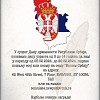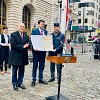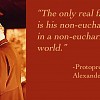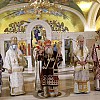Holy Resurrection Cathedral in Chicago Hosts The 7th Sts Sebastian and Mardarije Institute
Chicago, February 7, 2024
The 7th annual gathering of the Saints Sebastian and Mardarije Orthodox Institute was held Monday, February 5 through Wednesday, February 7, 2024. His Grace Bishop Longin of New Gracanica and Midwestern American Diocese and Holy Resurrection Cathedral in Chicago, Illinois hosted this year’s event.
This year’s keynote speaker was His Eminence Archbishop Demetrios, former Archbishop of America of the Greek Orthodox Archdiocese. While His Eminence was unable to travel to Chicago and attend the Institute in person owing to health reasons, his presence was certainly felt as he delivered each of his scheduled lectures over Zoom, which was quickly set up to accommodate the last-minute change in the schedule. As Archbishop Demetrios would note in his opening remarks, “I can see you and feel like I am completely with you.”
The Divine Liturgy was served Tuesday, on the feast day of the Venerable Mother Xenia of Rome celebrated by local and visiting clergy. In attendance was His Grace Bishop Irinej of Easter America. Children from the cathedral parochial school beautifully sang the responses for the entire liturgy which His Grace, at the conclusion, applauded them for, that their education and zeal for their Orthodox faith be a lifelong endeavor. All the children, as well as many lay participants who arrived for the Institute, partook of the holy sacraments.
Following a continental breakfast the clergy filled the main hall of the cathedral. His Grace Bishop Longin, the host hierarch, greeted His Eminence who, to everyone’s joy, appeared before the participates on a large screen prepared for this occasion. Bishop Longin noted, “This is the first time we are hosting this event in Chicago, and I am grateful to my beloved brothers in Christ, Bishop Irinej and Bishop Maxim who are here with us. We are very honored and blessed to have Archbishop Demetrios with us as the main speaker. As you may know, the Serbian Orthodox Church awarded His Eminence with the Order of St. Sava, the First Degree for his great love and support of the Serbian people shown for many decades. Your Eminence, you are a friend of the Serbian people of the church here and you will remain a father figure, especially for hierarchs and clergy. We pray to Almighty God that he grant you health and peace.”
In his first lecture, titled: “The Creative Power of the Ministry (Diakonia) of the Word”, His Eminence noted how in the gospels we read that Jesus was “preaching and teaching.” This is something the Apostles would later continue doing. But around the year 52 AD we had an extraordinary event. Namely, the first Letter of the Apostle Paul to the Thessalonians appears. This was a radical event in the sense that it introduced the Word in written form, as a text. By the end of the first century there were other letters of Apostles and the gospels in written form so that now we have a parallel with the oral preaching and teaching with the written word. Later, this written form of the ministry of the word we would have in various forms and categories, the apostolic fathers, the apologists, etc. In this way, the church fathers created a religious writing which, in fact, is a masterpiece in literature as language, as culture. For instance, St. John Chrysostom introduced in his writings quite a few new terms to the already rich Greek language, to express theological terms. This is an amazing tradition of the ministry of the Word in written form which we collectively call patristic literature, that is, the transmission of the message of the gospel through commentaries, exegesis, essays, even poems, all written with the same goal, to proclaim the Gospel. Today we have thousands of universities that deal with this patristic literature. Just as this literature introduced new terminology it also gave new meaning to old concepts. For instance, one aspect this literature is the hagiographical and martyrological texts. In the lives of the Saints, for instance, we see how the classical concept of a hero is now exemplified through simple, common people who, in their confession of their faith, create a new figure hero as martyr as a new anthropological term. It was this literature that preserved our people during the Ottoman rule.
This ministry constitutes a constant declaration of the gospel but it also poses many challenges, particularly in our contemporary world. This was the topic of his second talk which ensued a lively discussion since one of the challenges is the relationship the church has with politics. His Eminence noted that we must always be above politics. The martyrs are an example of being political.
Bishop Maxim’s words at the conclusion of the talk echoed the shared sentiment of all clergy and participants, when he noted that this is, “a rare and unique opportunity for us clergy and laymen—the fullness of the Church, to listen to somebody who encompasses and possesses the richness of our tradition in all its dimensions and aspects.”
The third and final day of the Institute began with Matins and following breakfast, His Eminence delivered his last and final talk entitled, One Jesus – Four Gospels. Our esteemed speaker and beloved Archbishop Demetrios thoroughly described the varying nuances in the writing styles of each of the four evangelists. He noted, for instance, in Mark’s gospel we see the alternating between divine authority and human suffering. Very early on in his gospel we hear of both the healing power of Jesus and immediately afterwards how the Pharisees make their way to Galilee to inquire about this rabbi so that they can condemn him. What’s also characteristic is the Lord’s call for all of us to take up our cross. That is, in following His divine authority we must endure suffering. In Luke’s gospel we are given a more detailed account not only of the Lord’s nativity, but the nativity of St. John the Baptist, not to mention that he gives us more historical details (e.g. “in the fifteenth year of the reign…” 3:1). Like Matthew, he also includes the beatitudes. However, where it states in Matthew “Blessed are the poor in spirit….”, Luke simply says, “Blessed are you poor.” His emphasis, therefore, is more on the philanthropy of Christ. The gospel according to Matthew portrays Christ as the unique teacher, where we read many of debates with the Jewish elders. In fact, they are criticized more in Matthew’s gospel than anywhere else. The word “hypocrite” is used ten times, while only three times in Luke’s gospel, once in Mark’s and it isn’t even used in John’s gospel. In John’s gospel Christ is the revealer of divine mysteries. It is a very different gospel than the others in which the Lord’s nativity is not in Bethlehem but He is portrayed as pre-existing, “In the beginning was the Word…”. Throughout his gospel we see the dialogue between Jesus and the people and the Lord’s declaration: “I am”, “the light”, “the way, the truth, and the life,” “the loving shepherd…”, etc. It is in this gospel that we see the Lord calling His disciples His friends, even though knowing that when the hour of His passion comes they will abandon Him. Later, when “the hour has come” He lifts his eyes to heaven and prays to the Heavenly Father that He protect the disciples, that they be united as He is united with the Father and Holy Spirit. At this point St. John reveals the tremendous desire of God for human beings, who are the Church, to be one. It’s a central point in the Gospel. Moreover, the unity of the church serves as evidence of the validity of the Lord’s coming into the world, that’s why the Lord says right after praying for this unity, “that the world will know that you sent Me”.
Even though there was an attempt in history to combine the gospels into a single coherent narrative, the so-called Diatessaron which was used in Syria for almost a century, it eventually disappeared. The four gospel narratives offer a different picture: Jesus as the superb teacher, Jesus as the one who moves between authority and passion, Jesus as the supreme philanthropist and Jesus as the revealer as the mysteries of God. These narratives give us the picture of the one Jesus who, in the end, is always a mystery. The archbishop noted how he has read the gospels from beginning to end and still on numerous occasions and still considers himself not knowing the gospel. This is because the gospel is not merely text but it’s the revelation, it’s the knowledge of Christ who is always revealing Himself to us but always remains a mystery.
Bishop Irinej, who moderated the closing presentation and vibrant Q&A session, profoundly thanked the Geron Archbishop for having woven such an intricate tapestry from the various offerings of the four gospels and presented us with a resplendent icon of the one Jesus Christ.
His Eminence expressed his appreciation to the organizers and partakers of the Institute noting the following: “I express my wholehearted thanks for the blessed spiritual opportunity offered to me to be part of the Chicago Sts Mardarije and Sebastian Institute. You have my warmest congratulations for managing so successfully the unexpected difficulties arising from my sudden illness, which, by the way, is not completely over yet. I hope that you were not disappointed by the unexpected difficulties. You are all precious to me, and will be, forever in my prayers.”
This year’s Institute, like years past, offered our clergy and devout faithful the opportunity to pray together, learn together and, most importantly, be together. This event brings together, as it did this year as well, participants from all our dioceses.
The seventh annual Saints Sebastian and Mardarije Orthodox Institute concluded with the dissemination of certificates, lunch, and fellowship.
Fr. Milovan Katanic
Fr. Bratso Krsic
|
| |||||||||||||







